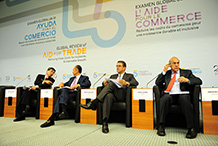In opening the Fifth Global Review, WTO Director-General Roberto Azevêdo said high costs arising from delays at the border and other obstacles “suffocate trade. They limit the gains from trade. Worse, the burden of high trade costs falls heaviest on the poorest countries, the smallest firms and the lowest income consumers.”
“High trade costs disconnect the economy from international flows of goods and services,” he continued. “They therefore stifle creativity – the motor behind productivity that drives economic growth. We must find ways to further cut trade costs, lower trade barriers, reduce distortive subsidies, and increase people’s capacity to trade, so that the poorest can access more of the benefits that trade can provide.”
World Bank President Jim Kim said that despite some scepticism that trade helps the poor, “our best evidence suggests that, when countries are effectively integrated into regional and global markets, their poorest citizens can reap substantial benefits.” He cited China, Viet Nam and Cambodia as examples where targeted reforms and openness to trade have boosted exports and substantially reduced the number of extreme poor.
More than 1,000 participants from around the world are taking part in the Fifth Global Review, which is examining actions being taken to reduce trade costs so that developing countries, and in particular least-developed countries (LDCs), can participate more effectively in global trade.
New study underlines benefits from reducing trade costs
As part of the Fifth Global Review, the WTO and the Organisation for Economic Cooperation and Development (OECD) launched a new joint report highlighting the importance for developing countries and LDCs in reducing trade costs in order to benefit from the market opportunities the multilateral trading system creates.
The report contends that cumbersome and time-consuming border procedures, obsolete or ill-adapted infrastructure, limited access to trade finance, and the complexity and cost of meeting an ever broader array of standards “all serve to price too many countries out of international trade”. It calls for a redoubling of efforts to tackle trade costs which continue to marginalise many of the world’s poorest and most fragile economies, and cites the TFA as an important step towards achieving this goal.
DG Azevêdo said implementation of the TFA would represent a “leap forward” in cutting trade costs. He cited Cambodia, Guatemala, Kenya, Lesotho, Peru, Tajikistan and Togo as examples where border modernization efforts have already led to faster clearance times, higher customs revenues and savings for traders.
OECD Secretary-General Angel Gurría said the joint WTO/OECD report “clearly shows that while producers in low-income countries are often competitive at the farm and factory gate, they are priced out of the international market”.
“This is because of cumbersome border procedures, poor infrastructure, lack of finance, and complex standards,” Mr. Gurría continued. The TFA “creates a significant opportunity to reduce trade costs and enhance participation in the global value chains”.
Donor support increasing
The WTO/OECD report notes that donors have already disbursed some USD 1.9 billion in aid for trade facilitation since 2005. Annual commitments now stand at USD 668 million, an eight-fold increase in donor support since 2005, with many donors indicating they intend to increase their support over the next five years.
Takehito Nakao, President of the Asian Development Bank, said his agency was increasing support for trade facilitation efforts in various parts of Asia, where more than 500 million people still live in extreme poverty. He highlighted a three-pronged approach to aid for trade including infrastructure investment, trade facilitation and trade finance in Asia and the Pacific
Joakim Reiter, Deputy Secretary-General for the United Nations Conference on Trade and Development, said high trade costs act as a double-edged sword.
“These costs squeeze citizens through lower wages in the export sector. At the same time, they lead to higher prices on imported consumer goods and deter investment.”
The Fifth Global Review will continue up to 2 July. More information on the meeting, including the full programme, news items, photos and background details are available here on the WTO website.
> Opening remarks by DG Azevêdo at plenary session
![]() Audio:
Audio:
> Opening remarks by Mr. Roberto Azevêdo, Director-General
> Problems viewing this page?
Please contact [email protected] giving details of the operating system and web browser you are using.

